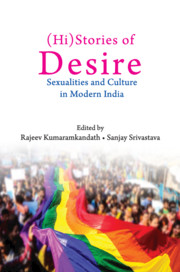Book contents
- Frontmatter
- Contents
- List of Images
- Acknowledgements
- Introduction: Sexuality and Sexualities
- 1 Politics of Prop Roots: Beyond ‘The Repressive Hypothesis’
- 2 Of Identities and Other Desires: Thinking about Sexualities
- 3 The Stuttered Process of Subject Formation: A Sex Worker's Experiments with Narration
- 4 Sexual Realism? (Hetero)Sexual Excess and the Birth of Obscenity in Malayalam Literature
- 5 Sexualizing Kālā Pāni
- 6 Memories of a Queer Sexuality: Revisiting Two ‘Toto’ Folk Tales
- 7 Learning about Sex in Mumbai: Rethinking the ‘Knowledge Gap’ Debate in Sexuality Education
- 8 Family Planning and the Masculinity of Nirodh Condoms in India
- 9 Women and Their Bodies: Menstrual Celebrations and Construction of Sexuality in Assam
- 10 Tanjai Prakash: Between Desire and Labour
- 11 Hijra Intimacies and Inheritances
- Notes on Editors and Contributors
- Index
1 - Politics of Prop Roots: Beyond ‘The Repressive Hypothesis’
Published online by Cambridge University Press: 24 December 2019
- Frontmatter
- Contents
- List of Images
- Acknowledgements
- Introduction: Sexuality and Sexualities
- 1 Politics of Prop Roots: Beyond ‘The Repressive Hypothesis’
- 2 Of Identities and Other Desires: Thinking about Sexualities
- 3 The Stuttered Process of Subject Formation: A Sex Worker's Experiments with Narration
- 4 Sexual Realism? (Hetero)Sexual Excess and the Birth of Obscenity in Malayalam Literature
- 5 Sexualizing Kālā Pāni
- 6 Memories of a Queer Sexuality: Revisiting Two ‘Toto’ Folk Tales
- 7 Learning about Sex in Mumbai: Rethinking the ‘Knowledge Gap’ Debate in Sexuality Education
- 8 Family Planning and the Masculinity of Nirodh Condoms in India
- 9 Women and Their Bodies: Menstrual Celebrations and Construction of Sexuality in Assam
- 10 Tanjai Prakash: Between Desire and Labour
- 11 Hijra Intimacies and Inheritances
- Notes on Editors and Contributors
- Index
Summary
A picture [of ‘The Repressive Hypothesis’] held us captive.
And we could not get outside it, for it lay in our language and language seemed to repeat it to us inexorably.
—Ludwig Wittgenstein, Philosophical Investigations (1958: 115).Foucault begins History of Sexuality (Volume 1) with sharp sarcasm pertaining to how a certain story regarding an earlier, that is, a seventeenth-century frankness and a later, that is, a nineteenth-century, Victorian repression of sexuality has become paradigmatic of not just our understanding of ‘sexuality’ but our understanding of the ‘political’ as well:
For a long time, the story goes, we supported a Victorian regime, and we continue to be dominated by it even today.… At the beginning of the seventeenth century a certain frankness was still common, it would seem. Sexual practices had little need of secrecy; words were said without undue reticence, and things were done without too much concealment;… But twilight soon fell upon this bright day, followed by the monotonous nights of the Victorian bourgeoisie.… On the subject of sex, silence became the rule.… This discourse on modern sexual repression holds up well, owing no doubt to how easy it is to uphold.… What sustains our eagerness to speak of sex in terms of repression [Foucault shows in the same volume how psychoanalysis remains complicit in what he calls The Repressive Hypothesis] is doubtless this opportunity to speak out against the powers that be, to utter truths and promise bliss, to link together enlightenment, liberation, and manifold pleasures;… This is perhaps what also explains the market value attributed not only to what is said about sexual repression, but also to the mere fact of lending an ear to those who would eliminate the effects of repression.… To say that sex is not repressed, or rather that the relationship between sex and power is not characterized by repression, is to risk falling into a sterile paradox. It not only runs counter to a well-accepted argument, it goes against the whole economy and all the discursive ‘interests’ that underlie this argument. (Foucault 1978: 3–10; italics mine)
The question Foucault poses to us: why do we say, with so much passion and so much resentment against our most recent past, against our present, and against ourselves, that we are repressed?
- Type
- Chapter
- Information
- (Hi)Stories of DesireSexualities and Culture in Modern India, pp. 1 - 22Publisher: Cambridge University PressPrint publication year: 2020

